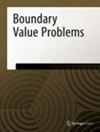反应-扩散方程耦合系统的罗宾问题
IF 1.7
4区 数学
Q1 Mathematics
引用次数: 0
摘要
本文研究了在索波列夫空间中具有罗宾边界条件的图灵型反应扩散方程的局部好求解性。利用哈达玛德规范,我们推导出受外力作用的线性初值-边界问题的 Fokas 统一变换解的估计值。随后,我们证明了由统一变换解定义并包含非线性而非外力的迭代图,在适当的求解空间内起着收缩图的作用。我们的结论性结果是通过应用收缩映射定理确定的。本文章由计算机程序翻译,如有差异,请以英文原文为准。
The Robin problems for the coupled system of reaction–diffusion equations
This article investigates the local well-posedness of Turing-type reaction–diffusion equations with Robin boundary conditions in the Sobolev space. Utilizing the Hadamard norm, we derive estimates for Fokas unified transform solutions for linear initial-boundary value problems subject to external forces. Subsequently, we demonstrate that the iteration map, defined by the unified transform solutions and incorporating nonlinearity instead of external forces, acts as a contraction map within an appropriate solution space. Our conclusive result is established through the application of the contraction mapping theorem.
求助全文
通过发布文献求助,成功后即可免费获取论文全文。
去求助
来源期刊

Boundary Value Problems
MATHEMATICS, APPLIED-MATHEMATICS
CiteScore
3.00
自引率
5.90%
发文量
83
审稿时长
4 months
期刊介绍:
The main aim of Boundary Value Problems is to provide a forum to promote, encourage, and bring together various disciplines which use the theory, methods, and applications of boundary value problems. Boundary Value Problems will publish very high quality research articles on boundary value problems for ordinary, functional, difference, elliptic, parabolic, and hyperbolic differential equations. Articles on singular, free, and ill-posed boundary value problems, and other areas of abstract and concrete analysis are welcome. In addition to regular research articles, Boundary Value Problems will publish review articles.
 求助内容:
求助内容: 应助结果提醒方式:
应助结果提醒方式:


